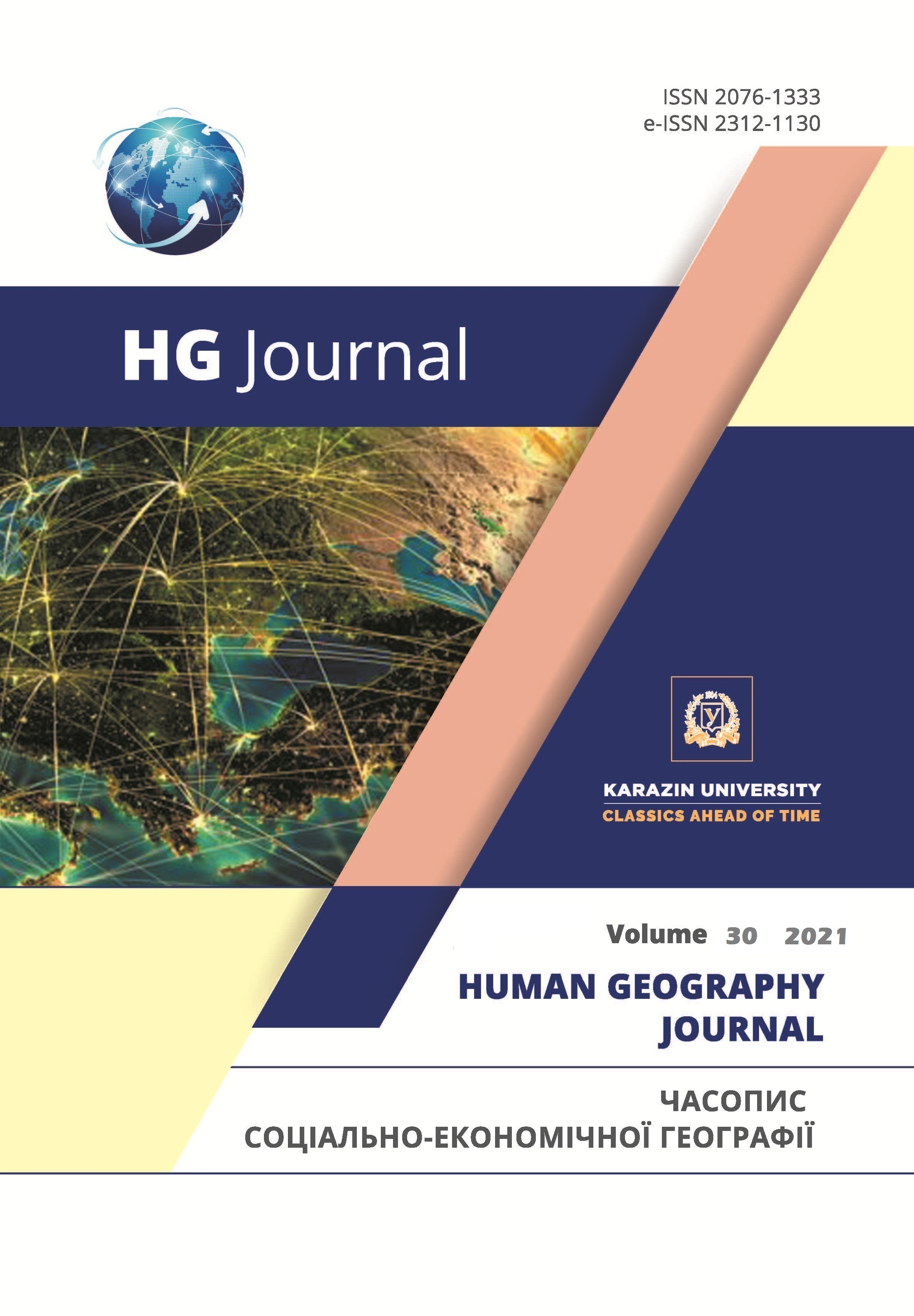Territorial differentiation of the language situation in Sumy region as a factor of formation of regional identity
Abstract
The article considers the scientific and methodological principles of geographical study of the regional identity of the population, analyzes and assesses the current state of the language situation in the region and creates recommendations for the Ukrainianization of public life in the region. The main attention is paid to the study of the language situation in Sumy region by conducting questionnaires, analysis of markers of territorial identity and information flows. The relevance of this approach is explained by the role of language as one of the most important and stable ethnic characteristics. Gender and age of respondents, as well as place of residence (type of settlement) were taken into account. The key element of the article is the results of the study, which cover the spread of Ukrainian, Russian and surzhik (pidgin) in everyday life of the region, their level of awareness about Ukrainian language being a civic value, the desire to learn foreign languages as an indicator of geopolitical orientation. According to the results of the research, a series of maps and diagrams was created.
An important manifestation of regional identity is toponymy, the names of local media, businesses and brands, catering establishments, hotels, sports teams and others. Ukrainian language as a mother tongue predominates in most administrative units of Sumy region. At the same time, the real bilingualism of the region's residents has formed the phenomenon of the most widespread so-called surzhik (pidgin) in Ukraine. Sumy region is not an integral historical and geographical region, perhaps that is why it does not have a high level of regional identity. The absence of obvious manifestations of separatism ensures a certain political stability in the region.
The process of creating a Ukrainian political nation continues, so the recommendations for the Ukrainianization of public life are based on the analysis of existing practices, existing multimedia content in the actual "information war" and take into account the ethnogeographical specifics of the region, its border position and current socio-political situation.
Downloads
References
Hozhenko, L.P., Siutkin, S.I., & Kuvandykov, R.D. (2019). Naukowo-metodychni osnowy suspilno-geografichnoho doslidgennya regionalnoi identychnosti naselennya [The Scientific and Methodological Foundations of the Social Geo-graphical Research on the Regional Identity of the Population]. Chetwerti Sumski naukowi geografichni chutannya. Sumy: A.S. Makarenko Sumy State Pedagogical University, 105-111 [in Ukrainian].
Hozhenko, L.P., Siutkin, S.I. (2020). Sotsialno-geografichnyi analiz regionalnoi identychnosti naselennya Symshchynu [Social-geographical Analysis of the Regional Identification of the Population of the Sumy region]. Naukowi zapysky of A.S. Makarenko Sumy State Pedagogical University, Geografichni nauky, 2(1), 120-134 [in Ukrainian].
Zhuchkevich, V.A. (1980). Obshchaya toponimika [General toponymy]. Minsk: Vysshaya shkola, 287 [in Russian].
Oliynyk, Ya.B., & Hnatyuk, O.M. (2013). Metodychni pidkhody do doslidzhennya terytorialnoi identychnosti nase-lennya [Methodical approaches to the study of the territorial identity of the population]. Ukrainskyi geohrafichnyi zhurnal, 3, 34-39 [in Ukrainian].
Mamontova, E. (2011). Movnyi faktor u formuvanni natsionalnoi kontseptosfery: derzhavotvorchyi aspekt [The lan-guage factor in the formation of the national conceptosphere: the state-building aspect]. Politychnyi menedzhment, 4, 27-36 [in Ukrainian].
Rossiysko-ukrainskoye pogranichye: dvadtsat let razdelennogo yedinstva / Pod red. V.A. Kolosova i O.I. Vendinoy. (2011) / [Russian-Ukrainian Borderlands: Twenty Years of Divided Unity / Ed. V.A. Kolosov and O.I. Vendina.] Mos-cow: «New Chronograph», 348 [in Russian].
Siutkin, S.I. (2015). Geografiya naselennya: Navch. posіbnyk [Geography of the Population: Tutorial]. Sumy: VPP «Fabryka dryku», 128 [in Ukrainian].
Siutkin, S.I. (2017). Politychna geografiya: Navch. posіbnyk [Political Geography: Tutorial]. Sumy: VPP «Fabryka dryku», 120 [in Ukrainian].
Copyright (c) 2021 Liudmyla Hozhenko, Sergii Siutkin

This work is licensed under a Creative Commons Attribution 4.0 International License.




